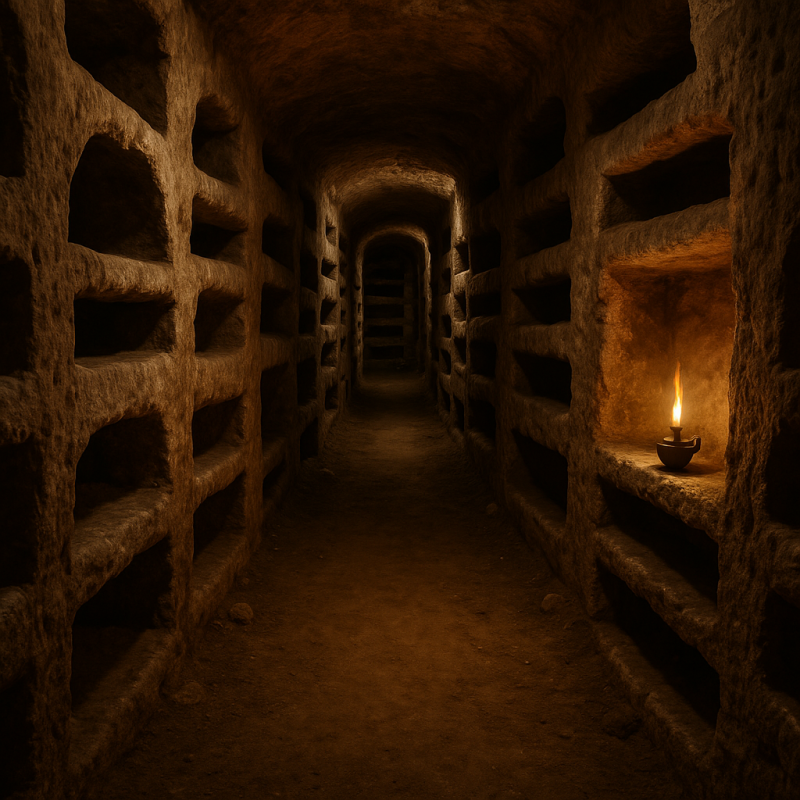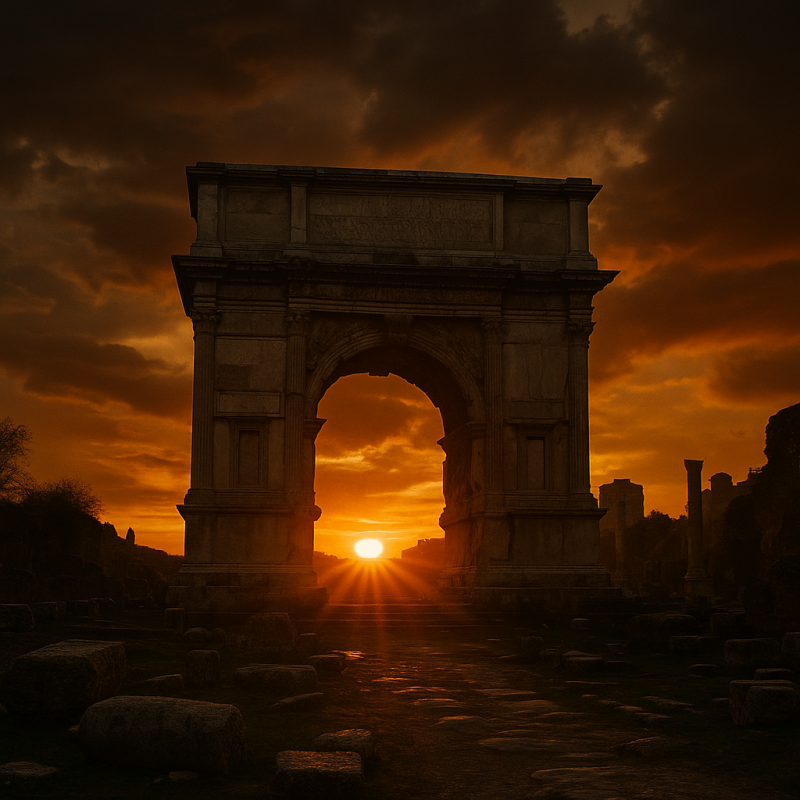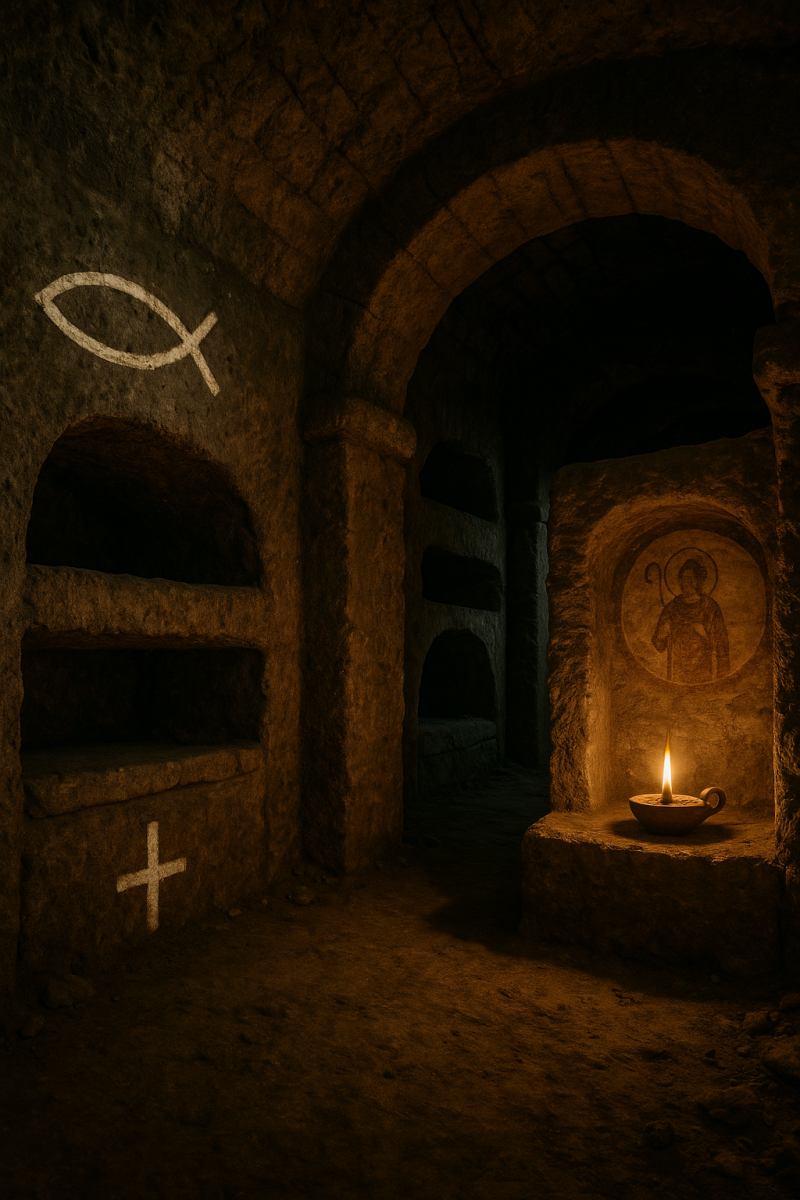The Long Drift
“They overcame him by the blood of the Lamb and by the word of their testimony…” Revelation 12:11

"The empire saw weakness; heaven saw fire."
In the heart of the underground, a quiet revolution silently brewed. Fueled by the unyielding faith of the persecuted. Water dripped from the cold stone as their voices rose, a gentle yet unrelenting storm that would one day shake the foundations of Rome. The walls were damp. The air, heavy with the scent of oil and clay. Down in the catacombs, where Rome buried its dead, the Church was alive. They whispered hymns in the dark. Worshipping God with songs no emperor could silence. Every prayer was defiance. Every baptism, rebellion. The empire saw weakness; heaven saw fire.
Beneath Rome’s marble and might, faith flickered like trembling oil lamps. These chambers of stone and silence held more power than a thousand legions. Here, Christianity was not mere religion — it was a living, breathing resistance. Shadows danced across the wet walls as believers gathered, their voices soft yet resolute. Each whispered Psalm challenged imperial pride; each ritual was a quiet revolution.
Emperors saw a scattered, hunted people. But these Christians saw something else entirely, a movement that would outlast stone walls and bronze swords. Their vulnerability became their strength. Their silence, their weapon. In darkness, they cultivated a light that would one day consume the very empire that sought to extinguish it. The damp walls witnessed their courage. The clay remembers their prayers. History bears their truth: Empires fall. Faith endures.
In the shadows of an empire that feared their faith, these believers found strength in unity. Their allegiance was not to Caesar, but to a crucified King whose Kingdom transcended earthly borders. Each gathering was a silent rebellion, a defiance against persecution that could cost them everything.
The ichthys - the simple fish symbol - became their secret language, a coded invitation to fellowship. Carved hastily on walls or traced in dirt, it spoke volumes where words could not. In cramped, hidden rooms, they would gather, their whispered prayers a dangerous symphony of hope. Bread broken and wine shared, as each meal was a remembrance of the sacrifice. They understood intimately what it meant to be an outcast, just as their Savior had been. Their faith was not a passive belief, but a living, breathing commitment that could demand the ultimate price. They knew that to be called a "Christian" was to potentially sign their own death warrant. Yet they embraced the name with a courage that burned brighter than the threats surrounding them. In a world of darkness, they were light.
Their resilience was not their own, but drawn from a source beyond human strength. A hope that could not be extinguished by sword or persecution. The early Christians were not mere victims, but transformative agents of hope. Their intellectual prowess matched their spiritual conviction, turning persecution into a powerful narrative of resilience. Justin Martyr embodied this spirit as a philosopher who used logic and eloquence to defend his faith, ultimately sealing his testimony with martyrdom. His death, like countless others, did not silence the movement but amplified its message.
Tertullian's prophetic words rang true: each drop of Christian blood spilled became fertile ground for new believers. The Roman arenas, designed to crush the faith, paradoxically became sacred spaces of spiritual multiplication. Every execution backfired, spreading the message further than any missionary could have imagined. These believers understood something profound: their strength was not in avoiding suffering, but in transforming it. Their courage was a quiet revolution, turning instruments of death into platforms of witness. They did not fight back with weapons, but with an unshakeable conviction that transcended physical pain.
The early Church grew not through conquest, but through the compelling power of sacrificial love. Every arena became an altar. The empire tried to drown the Church in blood — and instead, it watered a forest of faith.
"Every execution backfired, spreading the message further than any missionary could have imagined."


Their purity wasn't just moral—it was revolutionary.
In the shadows of an empire built on power and oppression, the early Christians stood as a radiant contrast. Their poverty was their strength, and their vulnerability was their courage. While Rome celebrated wealth and status, these believers carried something far more valuable: an unbreakable integrity that defied the world's brutal systems. When others bowed to Caesar's demands, they stood firm. Their "Lord" was not a political figure, but the Christ who taught love beyond calculation. Their faith wasn't a convenience, but a commitment that could cost them everything. In a society that discarded human life casually, they saw sacred worth. Abandoned infants, whom the empire viewed as disposable, became treasured children in their community. The poor, ignored and trampled, found dignity in their embrace. Their purity wasn't just moral—it was revolutionary. They didn't fight with swords, but with compassion. They didn't seek power, but served. Their radical love was a light that no imperial decree could extinguish, a testimony that challenged the very foundations of a cruel world.
Their legacy wasn't in monuments or conquests, but in transformed lives and an unquenchable hope that spread like fire through the ancient world. In the quiet corners of a world that sought to silence them, they gathered - not with grandeur, but with profound purpose. Their communion was more than ritual; it was a living, breathing connection that transcended mere tradition. Each shared meal, each whisper of a prayer, was a declaration of allegiance to something far greater than earthly powers. Their unity was forged in vulnerability and unwavering conviction. They understood that true strength wasn't measured by military might, but by the depth of their commitment. When persecution came, they did not scatter, but drew closer. Their love was not sentimental, but fierce - a love that could withstand torture, rejection, and death.
Emperors and rulers looked upon them with a mixture of confusion and fear. How could a people so seemingly powerless hold such transformative potential? Their holiness wasn't a pristine, untouchable concept, but a radical way of living that challenged every existing social structure. They knew their Kingdom was not of this world, yet they were determined to manifest its principles in every breath, every action. And in their radical surrender, they became an unstoppable force - not through violence, but through an unquenchable spirit of love and hope.
The transformation was sudden and profound. A faith, once hunted and martyred, now stood at the center of power. Constantine's vision—a celestial promise of victory—had rewritten the spiritual landscape of the Roman Empire. Christians who had once huddled in catacombs and secret meeting places now walked openly, their churches rising from hidden basements to magnificent structures. The whispers of persecution gave way to confident proclamations of faith.
Yet with this newfound freedom came a different kind of challenge. Power could corrupt as easily as oppression could break the spirit. The Church, long tempered by suffering, would now face the test of prosperity. Would they remember the humility of their origins, or would they be seduced by the very imperial authority that had once sought to destroy them? The cross that once symbolized execution has now become a banner of triumph. The martyrs' blood had not been shed in vain. Their endurance had transformed an underground movement into the official religion of the most powerful empire on earth.
A miracle, some would say. A political calculation, others might argue. But undeniably, everything had changed.
But freedom, like gold, can melt into something softer — and less pure.
Power could corrupt as easily as oppression could break the spirit.


Spiritual fire was replaced by ritual, genuine conviction by comfortable conformity.
When Constantine embraced Christianity, the transformation was profound and paradoxical. What was once a persecuted faith became the empire's official religion, shifting from underground passion to institutional power. The radical edge of early Christianity, its defiance, its raw spiritual intensity, began to soften. Martyrdom gave way to bureaucracy. Spiritual conviction transformed into political calculation. Believers who once risked everything for their faith now negotiated compromises in marble halls.
Temples that once echoed with pagan rituals were consecrated as churches. The blood of saints was quickly replaced by the ink of decrees. Spiritual fire was slowly extinguished by the cold winds of official acceptance. Where believers once whispered prayers in catacombs, now bishops wore elaborate robes and wielded political influence. Faith became a matter of ceremony rather than conviction. The revolutionary message of Christ was gradually domesticated, tamed by the very empire that had once sought to crush it.
The price of acceptance was the gradual erosion of authentic spiritual rebellion.
The transformation was subtle yet profound. What began as a radical movement of passionate believers, willing to face persecution and death for their convictions, gradually calcified into a cultural default. Tertullian's warning echoed unheeded through centuries, as Christianity shifted from a deeply personal, transformative encounter with the divine to a mere social marker. Where once Christians stood apart, challenging imperial power and societal norms, they now became an instrument of that very power. The Church, once defined by its radical love and resistance, now blessed the very systems it once challenged. Faith became a birthright, a passive inheritance passed down like a family heirloom, stripped of its revolutionary spirit.
The cost was immeasurable. Spiritual fire was replaced by ritual, genuine conviction by comfortable conformity. What was once a dangerous, living movement became an institutionalized religion, its edges smoothed, its radical core muted. The martyrs who once refused to compromise now seemed like distant, almost unrecognizable ancestors to a church that had learned to negotiate, accommodate, and ultimately, assimilate.
The transformation was subtle yet profound, a gradual erosion of spiritual simplicity. What began as a faith of radical equality and servant leadership became increasingly stratified, mirroring the imperial structures it once stood apart from. The early Christians, who gathered in homes and shared meals as equals, now found themselves in grand basilicas with clear distinctions of power and prestige. Church leaders, once content with humble robes and servant hearts, now adorned themselves in elaborate vestments that signaled rank and authority. The pastoral staff, once a symbol of guidance and care, became a scepter of institutional power. Where once leaders washed feet as Christ did, they now sat in elevated positions, separated from the congregation by architectural and social hierarchies.
This cultural compromise represented more than aesthetic changes. It signaled a deeper shift from a movement of radical love and community to an institution concerned with status, influence, and alignment with temporal power. The spirit of radical inclusivity was gradually replaced by bureaucratic structures that reflected more of the Roman Empire's organizational model than the egalitarian vision of its founder. In the shadows of marble columns and beneath the weight of imperial decrees, a silent transformation unfolded. Rome, once a persecutor of Christians, now sought to embrace and reshape the faith that had once threatened its very foundations. Laws shifted like tectonic plates, gradually realigning the relationship between state and spirit.
Yet the Church was no passive recipient. As imperial power touched its edges, the Church began to weave its own influence into the fabric of Roman governance. Bishops gained political clout, theological debates echoed in corridors of power, and Christian doctrine increasingly shaped imperial policy. But not everyone surrendered to this grand dance of adaptation. In remote monasteries, in hidden valleys, among stubborn communities and resolute individuals, the pure flame of original conviction burned bright. They remembered the martyrs, the early struggles, the raw and uncompromised faith that had survived centuries of persecution.
These holdouts whispered of integrity, of principles that could not be negotiated or softened by political expediency. Their resistance was quiet but unbreakable. A testament to the spirit that could not be legislated or controlled.
Rome, once a persecutor of Christians, now sought to embrace and reshape the faith that had once threatened its very foundations.


Where others saw deprivation, they discovered abundance
In the scorching sands of Egypt and Syria, a profound spiritual revolution unfolded. Weary of worldly ambitions and societal expectations, these desert fathers and mothers embarked on a radical journey of faith. They abandoned comfort, status, and noise, seeking something deeper—an intimate encounter with the divine. Their caves became cathedrals, their simplicity a profound testimony. Where others saw deprivation, they discovered abundance. Fasting replaced feasting, silence supplanted chatter, and prayer became their breath. They understood that true power resided not in political influence or social standing, but in radical surrender to God.
These ascetics were spiritual warriors, fighting invisible battles against inner demons and worldly attachments. Their lives proclaimed a revolutionary truth: that human worth is not measured by achievements or possessions, but by one's relationship with the divine. They took seriously Christ's words that His kingdom transcends earthly systems and structures. Their withdrawal was not escapism, but a deliberate choice to seek a deeper, more authentic spirituality—one stripped of pretense and focused purely on communion with God. In their radical simplicity, they challenged the prevailing narratives of success and power, offering a compelling alternative rooted in spiritual depth and radical devotion.
In the shadows of a world transformed, they carried a sacred legacy—monks, mystics, desert fathers and mothers who understood that true faith was not about comfort, but crucifixion. While emperors claimed Christianity and turned faith into political currency, these quiet souls retreated to caves, mountaintops, and forgotten corners, preserving the radical essence of Christ's call. Their tears were sacraments, their silence a profound testimony. They knew that following Jesus meant dying daily—to ambition, to ego, to worldly power. Where institutional religion grew comfortable, they remained uncomfortable, living witnesses to a gospel that demanded everything.
Like thin, unbreakable threads woven through history's tapestry, they maintained the authentic heart of spiritual transformation. Their lives whispered what institutional rhetoric often forgot: that salvation is not a transaction, but a total surrender. Through generations, their witness endured—a flickering flame of genuine devotion, passed from heart to heart, reminding anyone who would listen that the way of Christ was never about belonging, but about becoming.
The Church's ascent to power marked a subtle descent into spiritual complacency. What began as a radical movement of divine transformation gradually calcified into institutional ritual. The raw, revolutionary message of Christ—love, sacrifice, redemption—became muffled beneath ornate cathedrals and political machinations. As Christianity spread from a persecuted minority to the dominant faith of empires, something profound was lost. The early believers who met in homes, shared everything, and lived with breathless expectation of God's moving were replaced by hierarchies, bureaucracies, and calculated religious performances.
The wonder faded. Miracles became memories. Genuine spiritual hunger was supplanted by formal liturgy and theological debates. The Spirit, once experienced as a wild, transformative wind, was now contained, regulated, domesticated. Buildings grew taller. Influence expanded wider. But depth diminished. The church traded intimacy with God for the appearance of godliness. Power replaced passion. Institutional survival overshadowed spiritual revival.
In gaining the world, the Church risked losing her first love—the raw, unfiltered encounter with the living God that had once set her apart and propelled her forward. In the shadows of a world grown dark, fragile flames of faith continued to burn. Ancient stone walls held secrets of resilience, where devoted souls kept vigil against encroaching silence. Monasteries perched on windswept cliffs and hidden desert retreats became sanctuaries of remembrance, preserving the delicate embers of spiritual legacy.
Whispers of the Divine drifted through cold, quiet corridors—soft yet persistent. These hallowed spaces were not mere buildings, but living memories, guardians of a profound connection between humanity and the transcendent. Each worn stone, each flickering candle, spoke of endurance and hope. The Church, battered but unbroken, listened carefully to these ancient echoes. Her roots ran deep, deeper than momentary struggles or temporal challenges. In these quiet moments of reflection, she remembered her true nature: not an institution, but a living, breathing testament to something greater than herself.
The light was small, yes. But it had not been extinguished. And in that persistent flame lay an unquenchable promise of renewal and grace. The fire that once raged in the shadows now flickered beneath chandeliers. The faith that once overturned kingdoms began learning how to please them. But every age has its remnant — those who refuse to trade the fire for comfort.
The church traded intimacy with God for the appearance of godliness.

Next: Power and Piety: The Medieval Machine
When the Church’s gold glittered — but her heart grew cold.
I would love to know your thoughts about what you read above. Feel free to drop them below.
Add comment
Comments